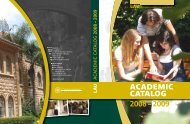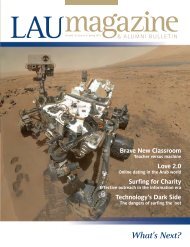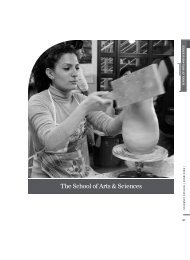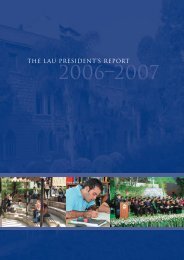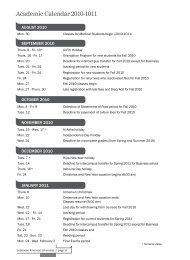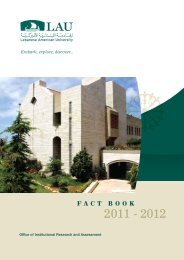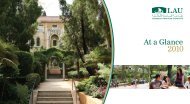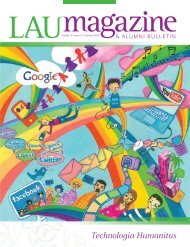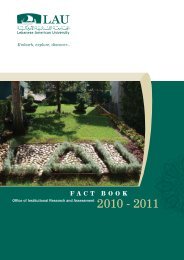academic-catalog2011.. - LAU Publications - Lebanese American ...
academic-catalog2011.. - LAU Publications - Lebanese American ...
academic-catalog2011.. - LAU Publications - Lebanese American ...
You also want an ePaper? Increase the reach of your titles
YUMPU automatically turns print PDFs into web optimized ePapers that Google loves.
Department of Education<br />
examines research in human development and<br />
psychology, and its implications to schooling,<br />
learning processes, teaching techniques, and<br />
other educational issues.<br />
EDU812 Literacies across the Curriculum<br />
[3-0, 3 cr.]<br />
This course examines contemporary theories<br />
of teaching, classroom practices of literacy<br />
processes, and authentic literacy assessment<br />
methodology. Students will be involved in<br />
examining a diverse range of views regarding<br />
literacy, and literacy education, and in<br />
constructing a coherent conceptual basis for<br />
their own practice as literacy educators in<br />
school contexts. It tackles different types of<br />
literacy including reading, writing, information,<br />
computer, math, and science literacy.<br />
EDU814 Comparative Education [3-0, 3 cr.]<br />
This course examines education in its sociocultural<br />
contexts, as it reflects and influences<br />
social, economic, and political life, nationally,<br />
and globally. It offers a framework of analysis<br />
and comparison of educational systems by<br />
examining issues of access, equity, quality, and<br />
efficiency.<br />
EDU822 Trends & Issues in Math Education<br />
[3-0, 3 cr.]<br />
This course aims to discuss the issues<br />
pertaining to the design, and development,<br />
of school mathematics, its teaching, and its<br />
learning. The main issues to consider relate to<br />
the nature of math, its philosophical, historical,<br />
epistemological, societal, and cognitive bases.<br />
The course includes a review of research, and<br />
a critical evaluation of math curricula, aiming<br />
at identifying, comparing, and contrasting,<br />
major trends of mathematics education.<br />
EDU823 Technology in Math Education<br />
[3-0, 3 cr.]<br />
This course investigates the effects of new<br />
technologies on school mathematics, and<br />
on teaching/learning. It has theoretical and<br />
practical components, aiming at reviewing<br />
research and major theories about technology<br />
mediation in math teaching/learning, as<br />
well as laboratory sessions for training<br />
students in using software for teaching<br />
math, designing relevant class situations,<br />
and developing appropriate math curriculum<br />
materials integrating suitable technology.<br />
Technologies considered include the different<br />
types of calculators (simple, scientific and<br />
graphic), and computer software (e.g. dynamic<br />
geometry, spreadsheets as math learning<br />
tools, computer algebra systems, and math<br />
education web-sites).<br />
EDU825 Mathematical Language,<br />
Representations, and Modeling [3-0, 3 cr.]<br />
This course aims at an epistemological,<br />
and didactical, study of mathematical<br />
representations, and symbolic systems, across<br />
the mathematical disciplines. It helps students<br />
develop situations where mathematical<br />
communication, and shifts among the different<br />
symbolic systems (from natural language to<br />
diagrams, tables, figures, graphs, drawings,<br />
etc...), contribute to the construction of<br />
knowledge and the understanding of concepts.<br />
The course includes a review of research on<br />
related processes, such as problem solving,<br />
modeling, representations, proof, logic, and<br />
mathematical reasoning.<br />
EDU832 Leading & Managing Schools/<br />
Education Institutions [3-0, 3 cr.]<br />
This course deals with the major topics of<br />
leadership versus management, decisionmaking,<br />
team management, responding to the<br />
external community, and school mission and<br />
values. Students will learn about managing<br />
the curriculum, reviewing/assessing student<br />
learning, and managing and allocating<br />
resources.<br />
EDU833 Trends & Issues in Educational<br />
Management [3-0, 3 cr.]<br />
This course covers the trends and issues<br />
such as school effectiveness, and school<br />
improvement, culture and ethos, evaluation/<br />
inspection, and induction. Issues in managing<br />
staff development and relations with<br />
stakeholders will also be explored.<br />
EDU837 Practicum in Educational<br />
Management [3-0, 3 cr.]<br />
This course is part seminar and part practicum.<br />
First, the practical component provides<br />
exposure to planning, organizing, and managing<br />
departments, schools, and other educational<br />
institutions such as technical institutions,<br />
colleges, and universities, under the supervision<br />
of the course instructor and the cooperating<br />
practitioner. Second, the seminar component<br />
focuses on the instructional supervision and<br />
the personnel management. Special attention<br />
is given to research in the field.<br />
EDU842 Trends & Issues in Early and Middle<br />
Childhood Education [3-0, 3 cr.]<br />
This course exposes students to the<br />
development and changes taking place in the<br />
field of early, and middle, childhood education.<br />
It also involves a critical evaluation of existing<br />
programs. Topics may include the recent<br />
developments in early and middle childhood<br />
education thought, such as integrated and<br />
interdisciplinary curricula, global education,<br />
and teaching models.<br />
ACADEMIC CATALOG [ 2011-2012 ] SCHOOL OF ARTS AND SCIENCES<br />
135



